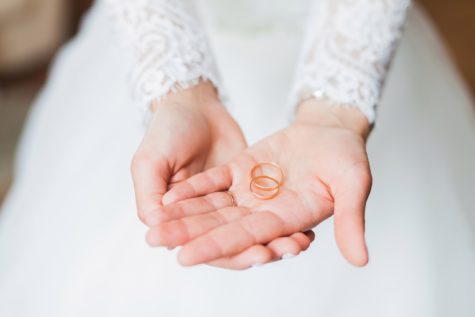RENO, Nevada — What’s in a last name? Muscle, apparently. Men married to women who opt to keep their maiden names after tying the knot are often viewed as less masculine and lacking pants in the relationship, a new study finds.
Researchers at the University of Nevada conducted three related studies in the United States and United Kingdom, hoping to learn how a woman’s decision to keep her last name affected how others perceived her husband.

The researchers’ first two studies found that whenever a husband’s last name differed from that of his wife’s, he was frequently described in ways that both deemphasized his masculinity and overemphasized any feminine characteristics.
Meanwhile, previous research has shown that wives who shun the time-tested naming tradition enjoy a number of benefits, including higher social status and perception of power, along with increased self-focus, ambition, and assertiveness.
These qualities run counter to older, rigid portrayals of women, which depict them as kind and nurturing, yet powerless, the researchers note.
“A woman’s marital surname choice therefore has implications for perceptions of her husband’s instrumentality, expressivity, and the distribution of power in the relationship,” says Rachael Robnett, the study’s lead author, in a journal release. “Our findings indicate that people extrapolate from marital surname choices to make more general inferences about a couple’s gender-typed personality traits.”
Robnett’s third study showed that men who held steadfast beliefs on traditional gender roles showed increased prejudice against husbands who didn’t share their last name with their spouse, seeing him as disempowered.
“We know from prior research that people high in hostile sexism respond negatively to women who violate traditional gender roles,” she explains. “Our findings show that they also apply stereotypes to nontraditional women’s husbands.”
While societal change benefiting women has continued at a steady pace, many feminists still wonder when women will no longer be expected to take on their husband’s surname, which they regard as an obsolete practice.
“The marital surname tradition is more than just a tradition,” Robnett argues. “It reflects subtle gender-role norms and ideologies that often remain unquestioned despite privileging men.”
The researchers published their findings last week in the journal Sex Roles.

“While societal change benefiting women has continued at a steady pace, many feminists still wonder when women will no longer be expected to take on their husband’s surname, which they regard as an obsolete practice.” So the inference here is that women who keep their parent’s name are more successful and the trend is growing as more women cast of the chains of their husband’s last name…. Such BS…. first off, did the study ever consider the fact that many times it is an already successful woman who chooses to keep her last name for professional reasons? Not the other way around..
Also I’d like to see the ratio of divorcees comparing those who keep their last name vs those who honor their family with a singular last name for everyone…. Seriously, liberals will never rest until the family unit is destroyed beyond repair…. and they have almost succeeded.
You know, in plenty of cultures, even in the West (as well as in the East), women traditionally keep their maiden names. In fact, in some places, everyone has two surnames (one from each parent) and nobody changes their names when they marry (Hispanic for example). The English way of doing things isn’t the only way and doesn’t make one more feminine, masculine, liberal, conservative, or whatnot if people decide eschew (or go with) the naming conventions. I changed my name when I married, but you would have thought the banks, SS, et cetera had never heard of the practice. They made it the biggest hassle, to the point that I would not have bothered to legally change my name if I had to do it over.
The English way is far more logical. From a legal perspective having a family unit with different last names is incredibly impractical.
Actually, the English perspective is a relic of a past wherein women were not legally considered as persons (i.e. like children). It had little to do with logic and practicality.
How it started is irrelevant (most people didn’t have last names before around 1100) it is imminently practical in today’s world. Casting away tradition that works perfectly well makes no sense.
It isn’t practical though. Practical is not having to go through the hassle. For me, it was an extreme hassle. I literally had to deal with the same bank multiple times, had issues with SS, and had issues having my name legally changed at a credit union, and on other forms of documentation. It was not nearly as effortless and easy as the process is often touted as being. My husband would have been fine with my decision either way. The only reason I bothered was due to pressure from my own parents and not from him. After seeing what I went through, my sister didn’t change her name. Somehow, everyone knows she’s married to her husband and that their kids are his. Nobody looks at him as being less masculine. I reckon the only individuals that like to lob such accusations against men are those that are afraid of women and are not secure in their own masculinity.
In plenty of cultures feminism doesnt exist either.
It’s so hard to take someone seriously in a comments section, when they don’t bother to use their legal name.
Women that keep their maiden names are not serious marriage material. They are in it for something else, another feather in her cap I presume. Been happily divorced for almost 10 years now. I have found what true freedom really feels like. Utopia.
As of today I will start calling Barack Obama, Barack Robinson…thanks for the correction!
He calls his tranny wife’s johnson Robinson.
It screams cuck.
Cuck / cuck / noun. 1. US informal A weak or servile man
2. Any man who voted for Hillary Clinton
3. Progressive beta male
“I was called a Cuck because I let my wife use her maiden name.”
They had to do a study to figure that out????
non story
what does this reveal about all those husbands in china whose brides keep their names because it is a cultural thing? are you wimpifying the most populous nation on the planet?
In China the way they name their children is, they take coin, toss it downstairs, and whatever sound the coin makes (“Ding Jong Zin Pin Dong Boon!) becomes their name.
Marcus Bachmann is masculine?
gee what a surprise. thats almost as obvious as concluding that women with hyphenated last names are usually @itches like say hillary rodham clinton
I’m a knuckle draggin’ male and I didn’t care. I’m not much for illogical traditions. Marriage means some protective laws if something happens to me she will have things easier. That’s about it to me.
…Must be love then.
Did brides keeping their last name cause this change in men, or did men like this marry those who would keep their previous name? That’s the divide between cause and correlation… but there I go again, using logic, reason, and mansplaing to undermine the dominant narrative. :/
I asked my future wife if she would change her name. Had she said no, then I would have not asked her to marry me.
My ex wife insisted on this 25 years ago. We divorced quickly (shocker)!!!
And now she is on her 4th marriage has like 5 kids, and Im pretty sure is collecting public assistance.
I am grateful she never took my name!!!
Well, isn’t that the WHOLE point of the deal, ANYWAY!?
Real women, who like real men, WANT to have their husband’s name because they are proud to be part of his family. Women who don’t, are not proud of their men, and there is probably a reason why.
I suppose this is OK unless one wants to establish a family and have children.
What a load of dog squeeze!
How is this surprising? if your dad is Albert Einstein it’s one thing, but if your dad is Bert Schmall and he works at UPS ?????